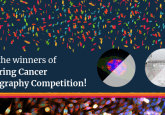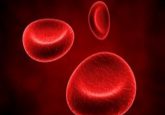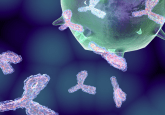Conference Chair highlights: World Congress on Gastrointestinal Cancer

At the 20th World Congress on Gastrointestinal Cancer (ESMO-WCGI) (Barcelona, Spain, 20–23 June 2018), I had the pleasure of speaking with the two Conference Chairs; Mario Dicato (Luxembourg Medical Center, Luxembourg) and Eric Van Cutsem (University of Leuven, Belgium) about this year’s congress. In this piece, discover their favorite talks and highlights from across the 4 days of the congress.
Day 1: HCC and cholangiocarcinoma abstract highlights
On the first day of the conference, several key abstracts covering cholangiocarcinoma and hepatocellular carcinoma (HCC) were presented. Eric Van Cutsem picked out this session as one his conference highlights.
The first abstract presented in this session explored the efficacy of TAS-120, an irreversible fibroblast growth factor receptor (FGFR) inhibitor, in cholangiocarcinoma patients with FGFR pathway alterations who were previously treated with chemotherapy and other FGFR inhibitors. The study demonstrated that TAS-120 has compelling clinical activity and a manageable adverse effect profile in cholangiocarcinoma patients with FGFR2 gene fusions and, furthermore, it exhibited efficacy in patients who progressed on prior FGFR inhibitors. A Phase II study of TAS-120 in CCA patients with FGFR2 gene fusions has been initiated.
Another key abstract in this session highlighted two global randomized Phase III studies: REACH-2 and REACH. These trials have demonstrated that treatment with second-line ramucirumab (Cyramza®) improves median overall survival by 3.1 months compared with placebo in patients with advanced HCC with alpha-fetoprotein levels ≥400 ng/ml.
Later on in the day, data were presented from the Phase III PRODIGE 24/CCTG PA.6 trial. This trial has demonstrated that adjuvant chemotherapy with mFOLFIRINOX is superior to gemcitabine after pancreatic cancer resection and should now be considered the new standard of care after pancreatic cancer resection in patients with a good performance status. Read the full news story here.
Day 2: HCC plus esophageal and gastric cancer
The second day of the congress saw several keynote lectures; one of our favorites was the presentation of overall survival results from the Phase III trial (TAGS) evaluating trifluridine and tipiracil (TAS-102) in patients with metastatic gastric cancer. More details of the trial can be found here.
As one of his highlights, Mario selected Session VIII, which focused on diseases and cancers of the liver. This session included a keynote lecture from René Adam (Paul Brousse Hospital, France) and an abstract exploring the Phase III CELESTIAL trial by Philippe Merle et al.
Day 3: Colorectal cancer (CRC), liquid biopsies and more
Mario selected several presentations from Day 3 of the congress as ones to watch. First up was a talk by Peter Gibbs (Walter and Eliza Hall Institute of Medical Research, VIC, Australia), which discussed the relevance of circulating DNA in Stage II colon cancer. Mario also enjoyed a presentation by Sabine Tejpar (University Hospital Gasthuisberg, Belgium), which highlighted novel insights into the molecular and immunologic classification of CRC.
Another talk from this session that we found particularly interesting was by Fortunato Ciardiello (Second University of Naples, Italy) on the current status and perspectives of liquid biopsies in gastrointestinal cancer. We have seen a great deal of excitement about the potential that liquid biopsies offer across oncology in recent months – have a look at the news articles below to find out more:
- Blood samples could predict which cancer patients will respond to immunotherapy
- ESMO WCGI: How liquid biopsy’s can provide insight into why some cancer treatments lose effectiveness
In addition to these presentations, both Eric and Mario selected the keynote lecture on coping with escalating healthcare costs in 2018 and beyond as one of their favorite presentations. The talk, which was presented by Josep Taberno (Vall d’Hebron University Hospital, Barcelona, Spain), current president of ESMO, tackled the issue of how to manage the skyrocketing costs of healthcare in cancer.
Mario stressed that not only the cancer drugs which represent around 20% of healthcare cost, but that the total health care cost for oncology is increasing faster than the GDP for most countries.
Taberno commented in a press release that: “Framed on the fable of the hare and the tortoise, I will uphold that the entire oncology ecosystem should better combine the alacrity of the former and the deliberate progress of the latter to achieve optimal outcomes for all stakeholders in oncology.
“It’s not just about treasury. It is currently estimated that cancer now accounts for 34.1% of the total pharma industry pipeline, up from 26.8% in 2010, and that collectively, researchers are investigating more than 5200 cancer agents, an increase of 7.6% from last year. I believe that we must identify ways to better deal with this avalanche, avoid costly duplication in our drug development efforts, and favor those therapies with proven as opposed to promising clinical benefit.”
Day 4: VOLFI trial, optimal first-line treatment for CRC
The last day of the conference focused on CRC and future perspectives for the field. From the great array of talks on the last day of the congress, Eric selected a few colorectal abstracts as his highlights. These include the Phase II TASCO1 study evaluating trifluridine/tipiracil + bevacizumab and capecitabine + bevacizumab in first-line unresectable metastatic CRC patients who are non-eligible for intensive therapy (TASCO1). Primary analysis has demonstrated that the promising activity of TT-B observed in the C-TASK Force trial was confirmed in the TASCO1 Phase III trial in first-line metastatic CRC patients non-eligible for intensive therapy. The opportunity to conduct a global confirmatory Phase III trial versus C-B is currently being evaluated.
Looking forward
Overall this year’s meeting encompassed engaging and varied number talks; exploring screening, diagnostics, economics and the latest advancements in the management of gastrointestinal cancers. We were honored to attend alongside 3500 other delegates from across 120 countries and we can’t wait to attend again next year!
For more conference coverage, check out our news page or follow us on twitter.
ESMO-WCGI news coverage:





